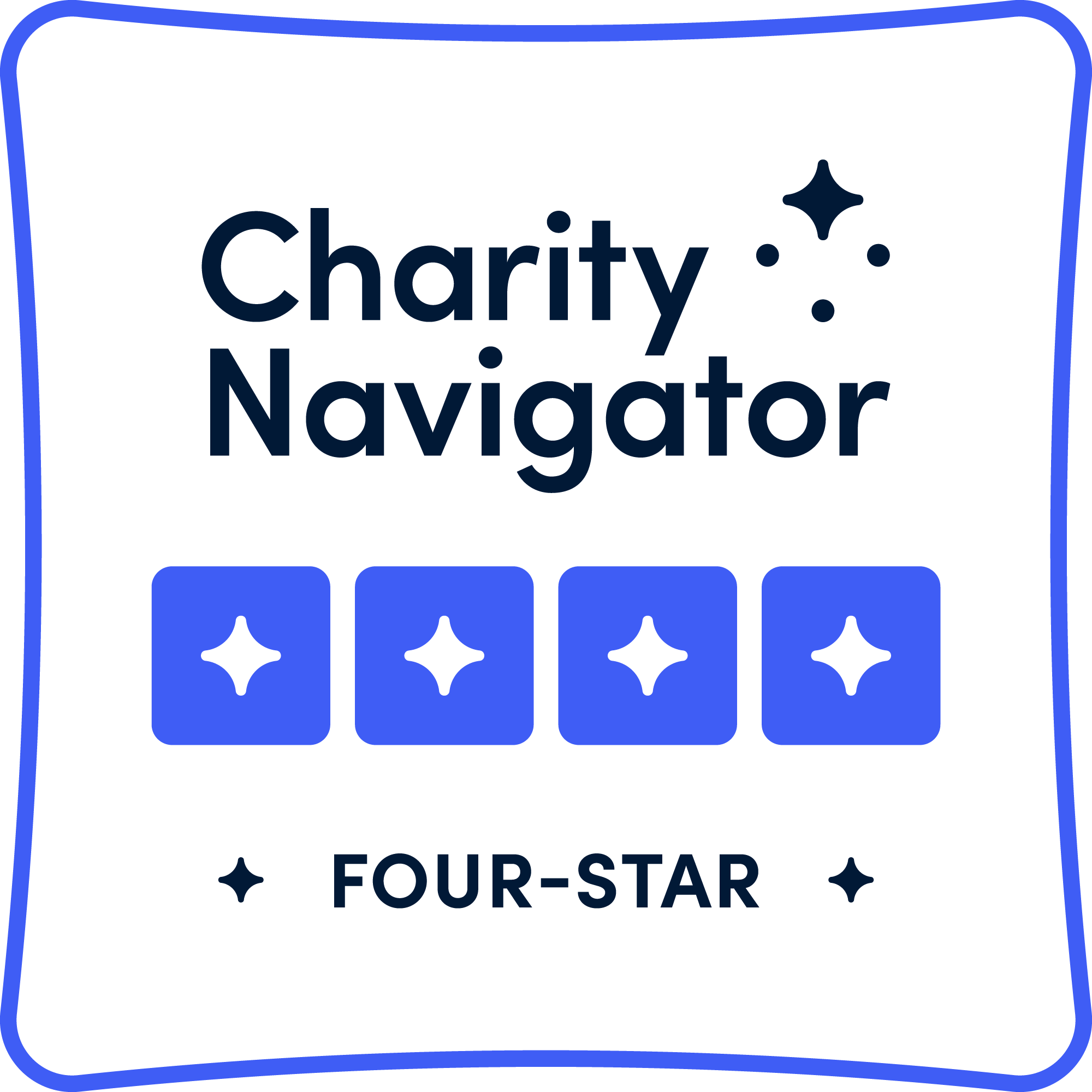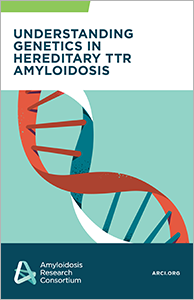Patients
Filter By:
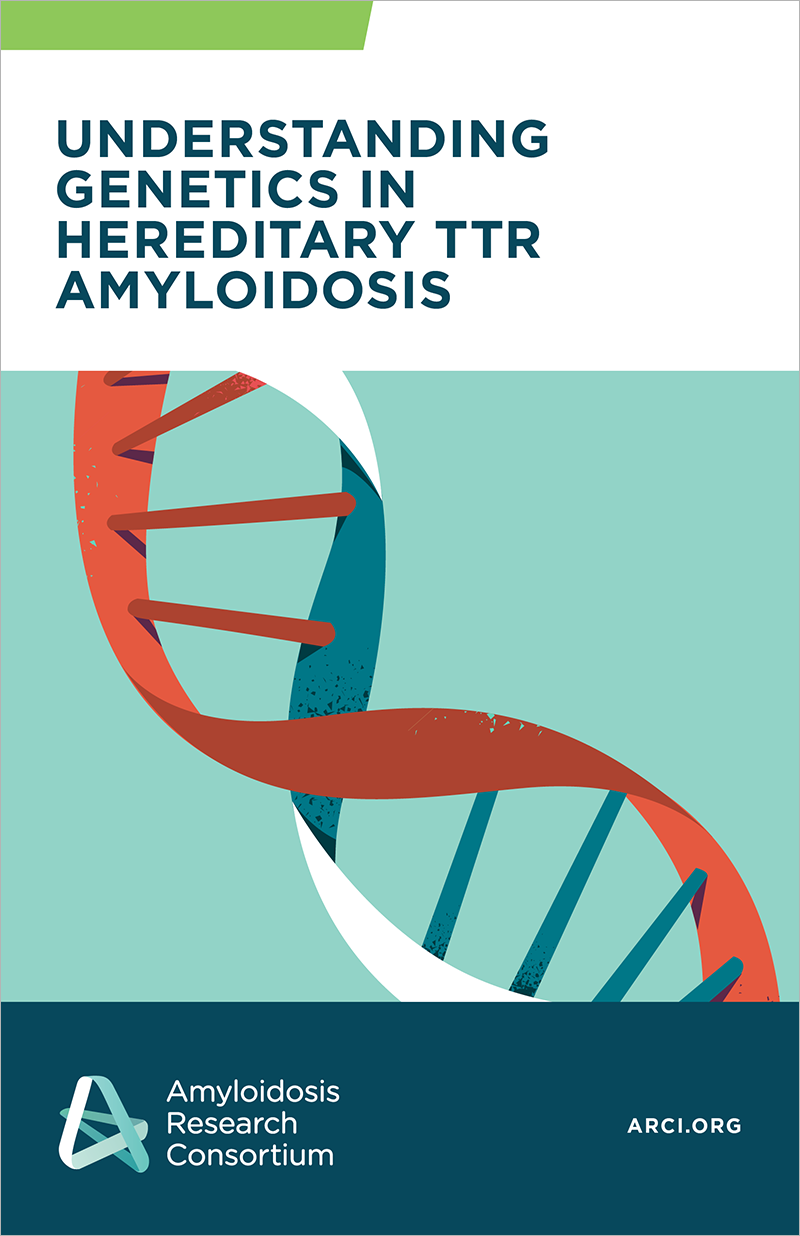
Understanding Genetics in Hereditary ATTR Amyloidosis
There are over 120 different mutations that have been identified in the TTR gene and as research continues, it is possible that more may be discovered. Each mutation causes a different pattern of disease onset, symptoms and outlook.
Read More
Library
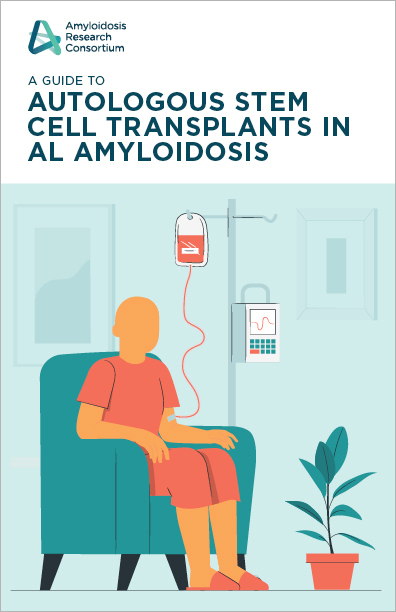
Autologous Stem Cell Transplants in AL Amyloidosis
The Autologous stem cell transplant (ASCT) procedure has been used as a treatment option for AL patients for several years. Eligible patients undergo the process of stem cell collection, high-dose chemotherapy, and transplantation of the healthy stem cells back into the body. This process can be quite challenging for patients, as the body undergoes a complete immune system wipe out and regeneration. The purpose of this booklet is to provide insight into the process, including tips and recommendations for preparation.
Read More
AL Amyloidosis
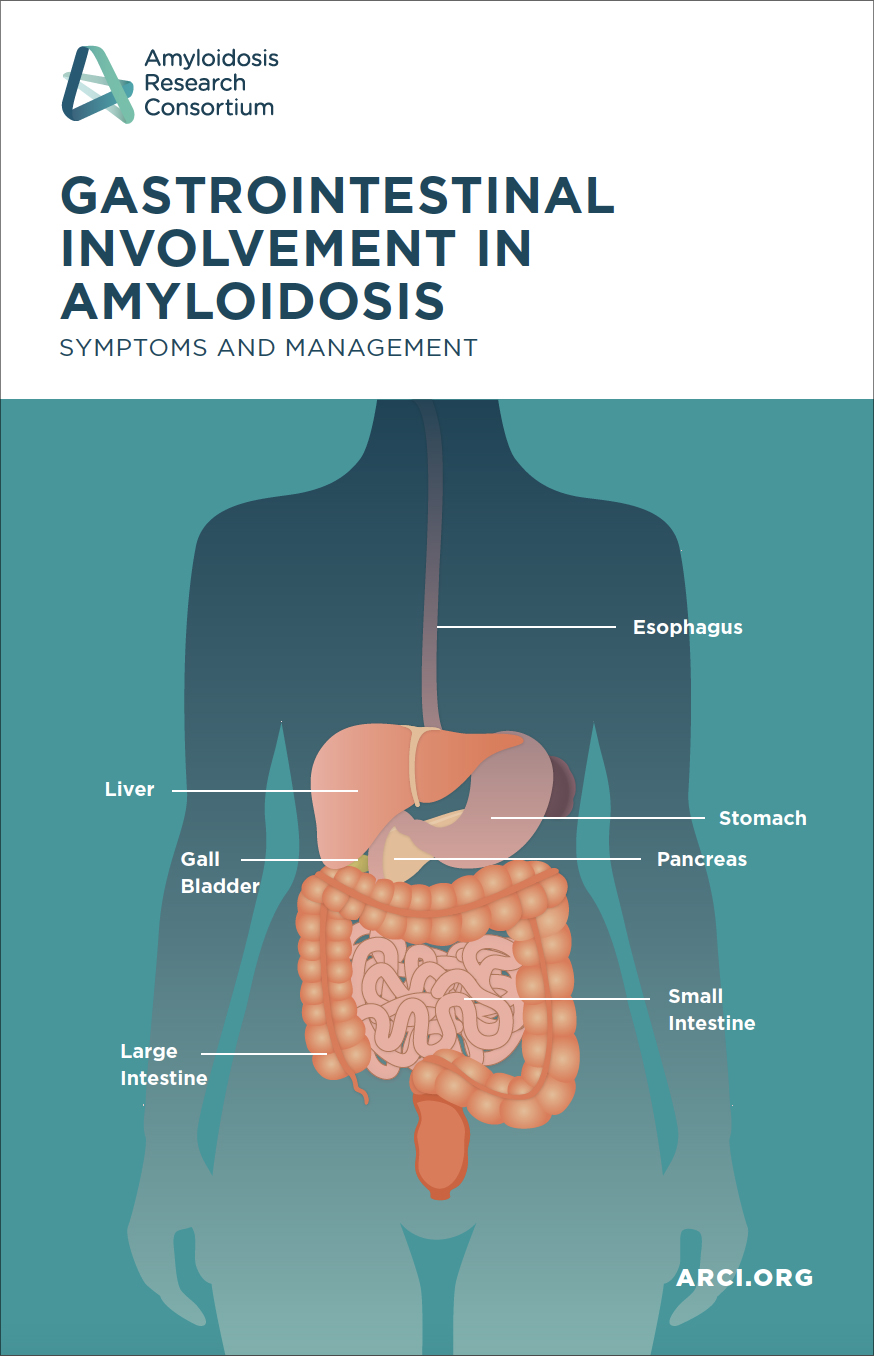
Gastrointestinal Involvement in Amyloidosis
Many types of amyloidosis can affect patients’ gastrointestinal (GI) tract, causing painful, annoying, or even debilitating symptoms. It is common for patients with amyloidosis to experience GI involvement and in fact, some patients may have GI-related symptoms as their most predominant sign or chief complaint.
Read More
AL Amyloidosis
Empowering Patients: Navigating Your Care
Isabelle Lousada shares her experiences with amyloidosis and the lessons learnt on how to become an empowered and informed patient. Lisa Mendelson, nurse practitioner from Boston University’s Amyloidosis Program provides a valuable medical perspective about how to build a successful relationship with your care team. Original presentation date June 23, 2022.
Read More
AL Amyloidosis
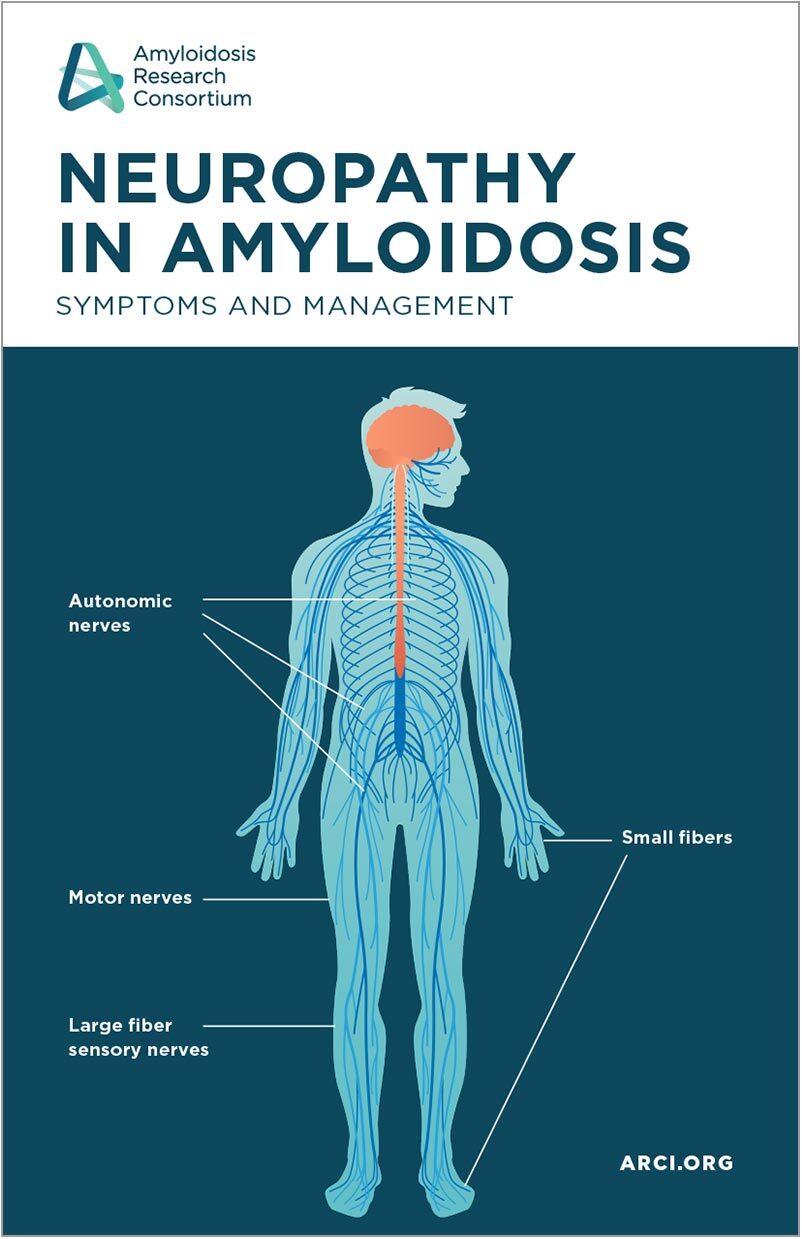
Neuropathy in Amyloidosis
Many types of amyloidosis can affect patients’ nerves, causing painful, annoying, or even debilitating symptoms. It is common for patients with amyloidosis to experience neuropathy and in fact, some patients may have nerve-related symptoms as their most predominant sign or chief complaint.
Read More
AL Amyloidosis
AL Amyloidosis: Treatment Approaches
Dr Sasha Tuchman, Director of the Myeloma and Amyloidosis Program at UNC gives an overview of AL amyloidosis, before taking a deep dive into the different types of currently available treatments for different disease stages. He also touches on future directions including clinical trials. The webinar concludes with an audience question and answer session.
Read More
AL Amyloidosis
Mental Health Matters: Caring for your Wellbeing
Rare disease mental health expert Kym Winter will equip you with the resources and tools you need to take care of your mental health.
In this interactive session, you will be introduced to the Stress Bucket Approach, which is a simple way of thinking about and looking after your own - and others’ - emotional wellbeing in order to live well with the impacts of a rare disease such as amyloidosis. Original presentation date February 23, 2022
Read More
AL Amyloidosis
Coffee with ARC: Learn about ARC’s work
In this ARC Talks special presentation, Coffee with ARC, some members of the ARC team will provide an overview of ARC's history and areas of focus, as well as our plans for 2022 and beyond. Original presentation date December 9, 2021
Read More
AL Amyloidosis
Living Well with Amyloidosis
In amyloidosis, common symptoms such as gastrointestinal manifestations and neuropathy are often the most troublesome for patients. In our ARC Talks Webinar for patients and caregivers, amyloidosis experts from across multiple specialties explain approaches for symptom management. Our experts provide you with the knowledge you need to live well with amyloidosis. Original presentation date October 26, 2021
Read More
AL Amyloidosis
The Role of Gene Editing in hATTR Amyloidosis
In this ARC Talks Webinar for patients and caregivers, Professor Julian Gillmore, the Head and Research Lead of the National Amyloidosis Centre in London, describes the role of gene editing in hereditary diseases like hATTR, and shares the early results of Intellia’s CRISPR trial. Intellia’s Head of Development for In Vivo programs, Dr. Liron Walsh, joins Professor Gillmore for a question and answer session.
Read More
Webinars
Taming Wild-Type
This ARC Talks Webinar covers everything that patients and their families should know about wild-type transthyretin amyloidosis. Dr. Martha Grogan, Founder and Director of the Cardiac Amyloid Clinic at the Mayo Clinic, covers disease progression, prognosis, treatment options, and more. Dr Grogan then answers questions from the audience from our live presentation on June 10, 2021.
Read More
Webinars
Stem Cell Transplantation in AL Amyloidosis
This ARC Talks Webinar covers everything that patients and their families should know about the role of stem cell transplantation in AL amyloidosis. Dr. Sandy Wong, Director of the Amyloidosis Program at the University of California San Francisco, describes the process of stem cell transplantation for AL amyloidosis patients. Terry Fogaren, a nurse practitioner from Tufts University Medical Center, shares information on how to prepare for and best recover from the procedure. The presentations are followed by a Q&A session from our live presentation on May 13, 2021.
Read More
AL Amyloidosis
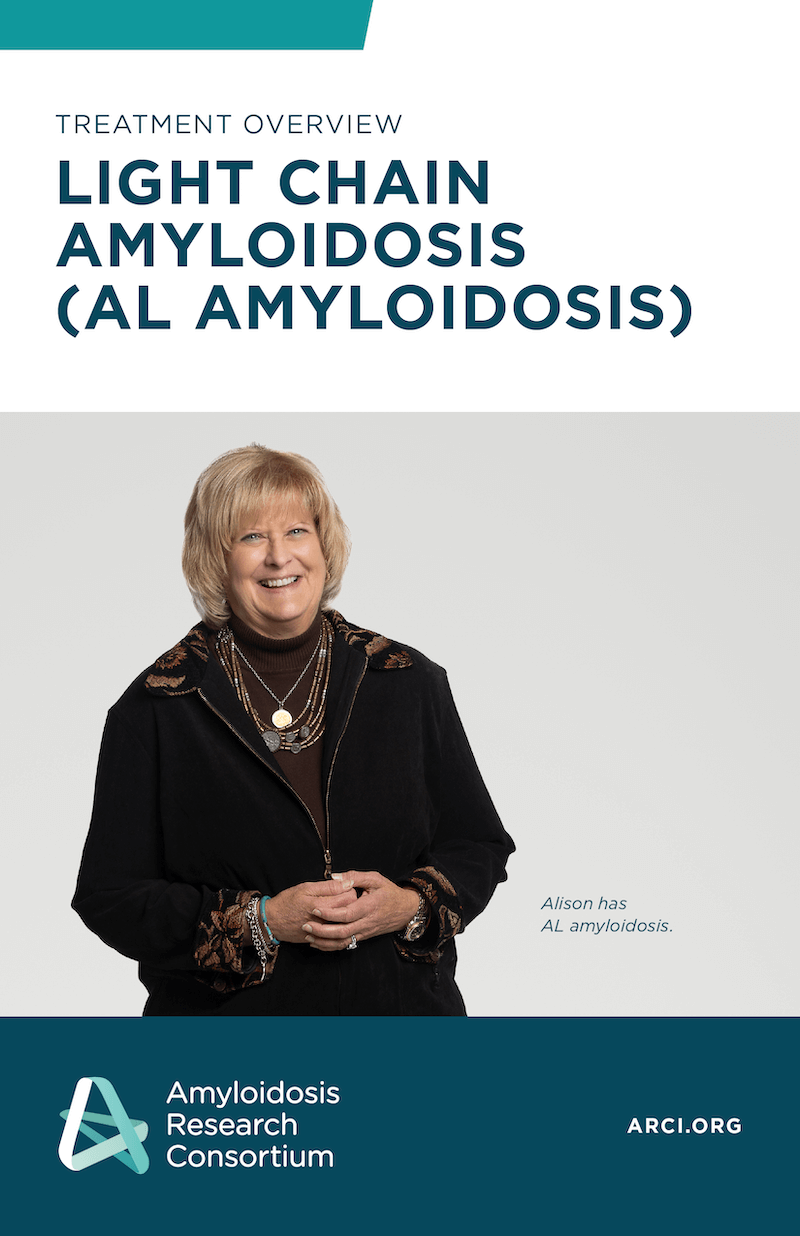
Treatment Overview: Light Chain (AL) Amyloidosis
AL amyloidosis is a serious disease. However, many patients benefit from current therapies, with their lives improved and prolonged, often for many years.
Read More
AL Amyloidosis
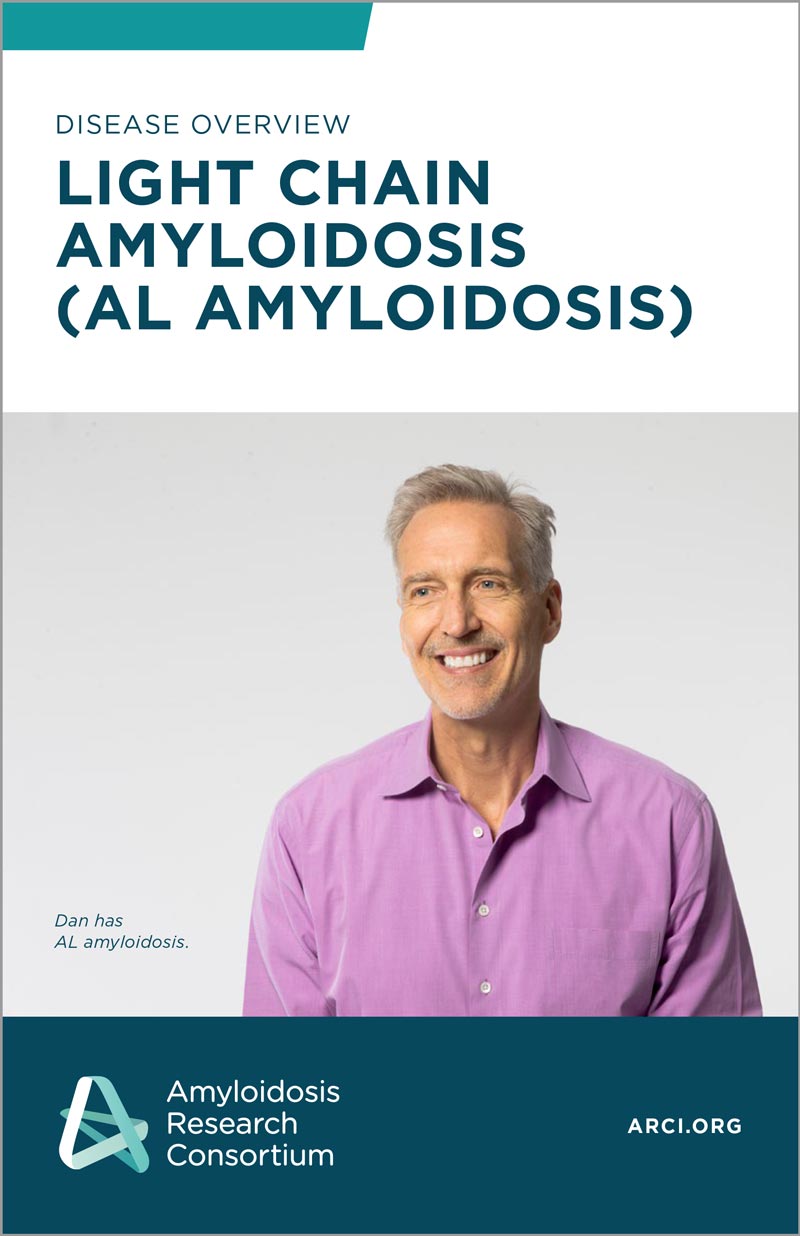
Disease Overview: Light Chain (AL) Amyloidosis
A diagnosis of light chain amyloidosis (AL amyloidosis) can be confusing and stressful, bringing up many feelings and questions. It is important to learn as much as possible about the disease, its treatment, and how it might affect you.
Read More
AL Amyloidosis
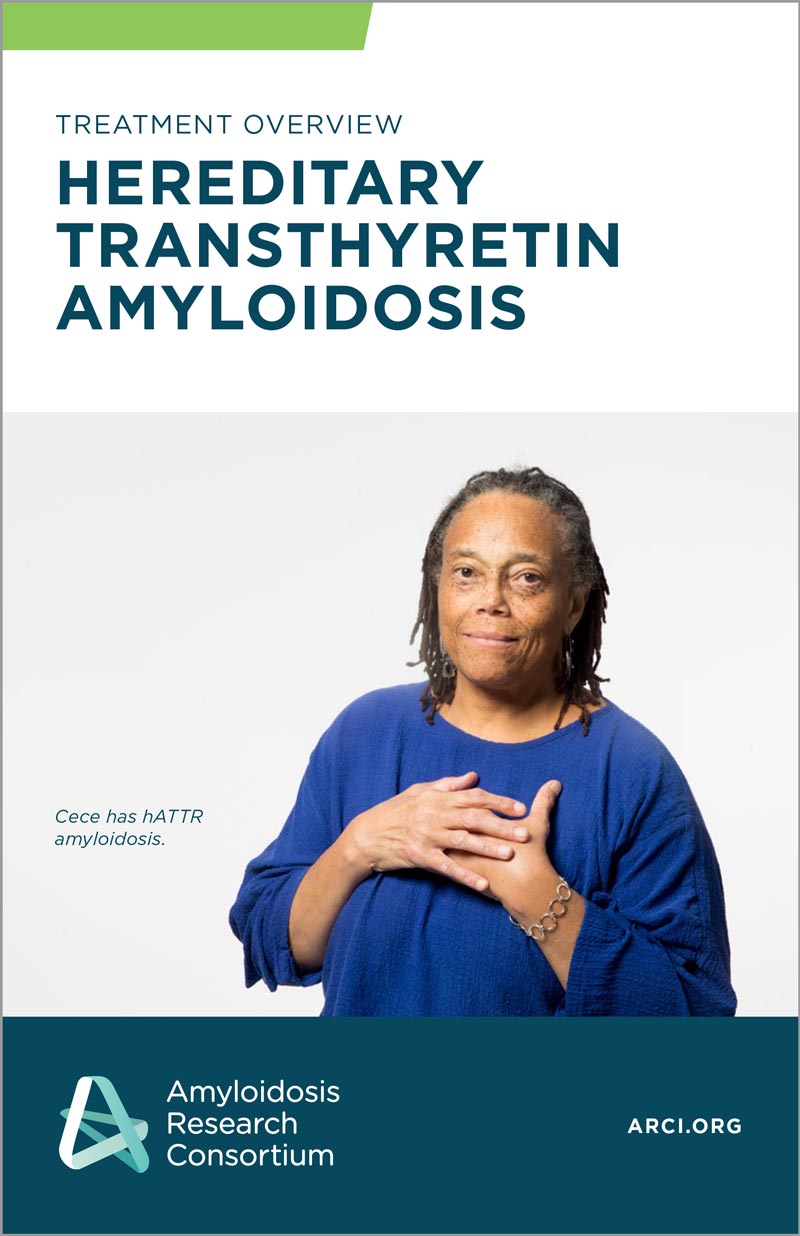
Treatment Overview: Hereditary Transthyretin Amyloidosis
We live in a time of rapid advances in genetic know-how and pharmacological technologies. The pace of discovery is accelerating, driving the development of new therapies, with 3 newly approved treatments. The exact course of hATTR varies with each patient, but the outlook holds promise for all. This booklet is designed as a comprehensive guide to help you and your family navigate treatment resources and options that would be most effective for you.
Read More
Library
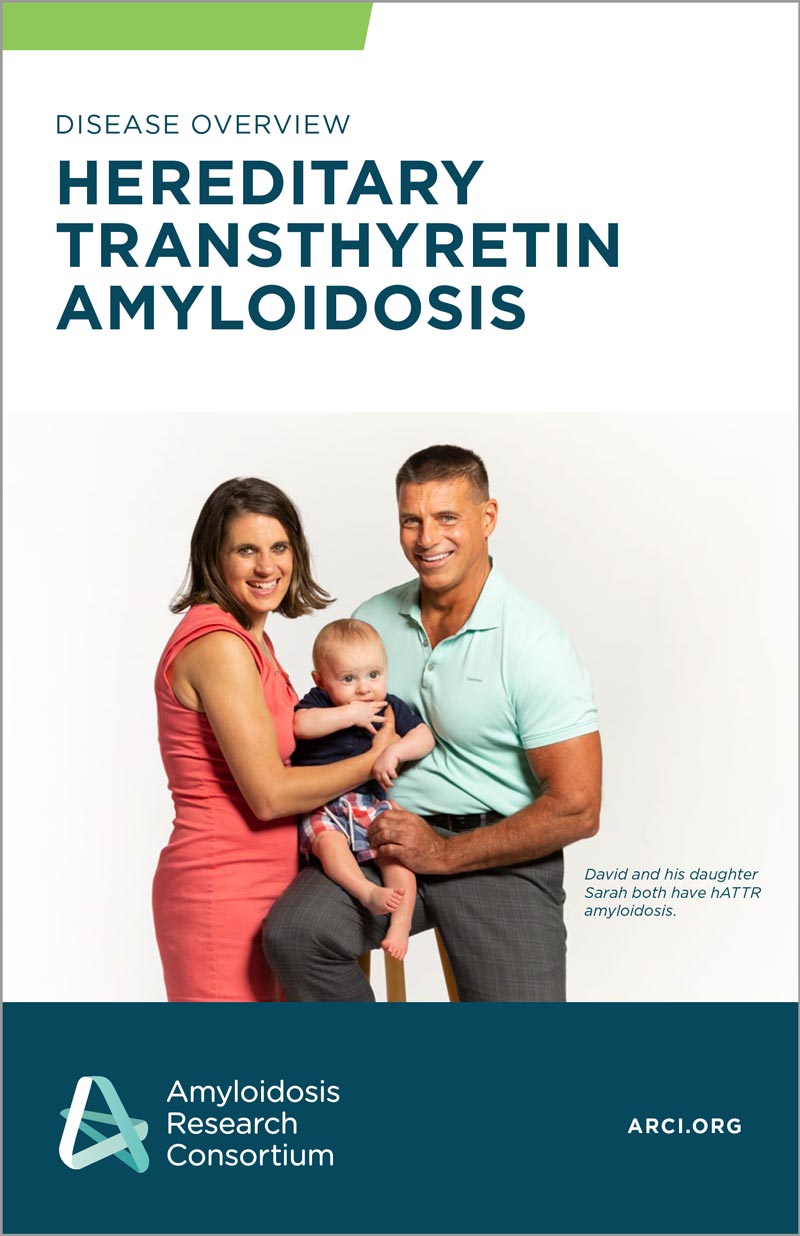
Disease Overview: Hereditary Transthyretin Amyloidosis
Hereditary transthyretin amyloidosis (hATTR) is a rare, systemic disease passed down through families. Caused by genetic mutations in the transthyretin (TTR) gene, it leads to a buildup of abnormal proteins called amyloid in one or more organs and tissues, impairing their function. Left untreated, hATTR can cause life-threatening complications. Early diagnosis and treatment are critical to prevent or delay progression of hATTR.
Read More
Library
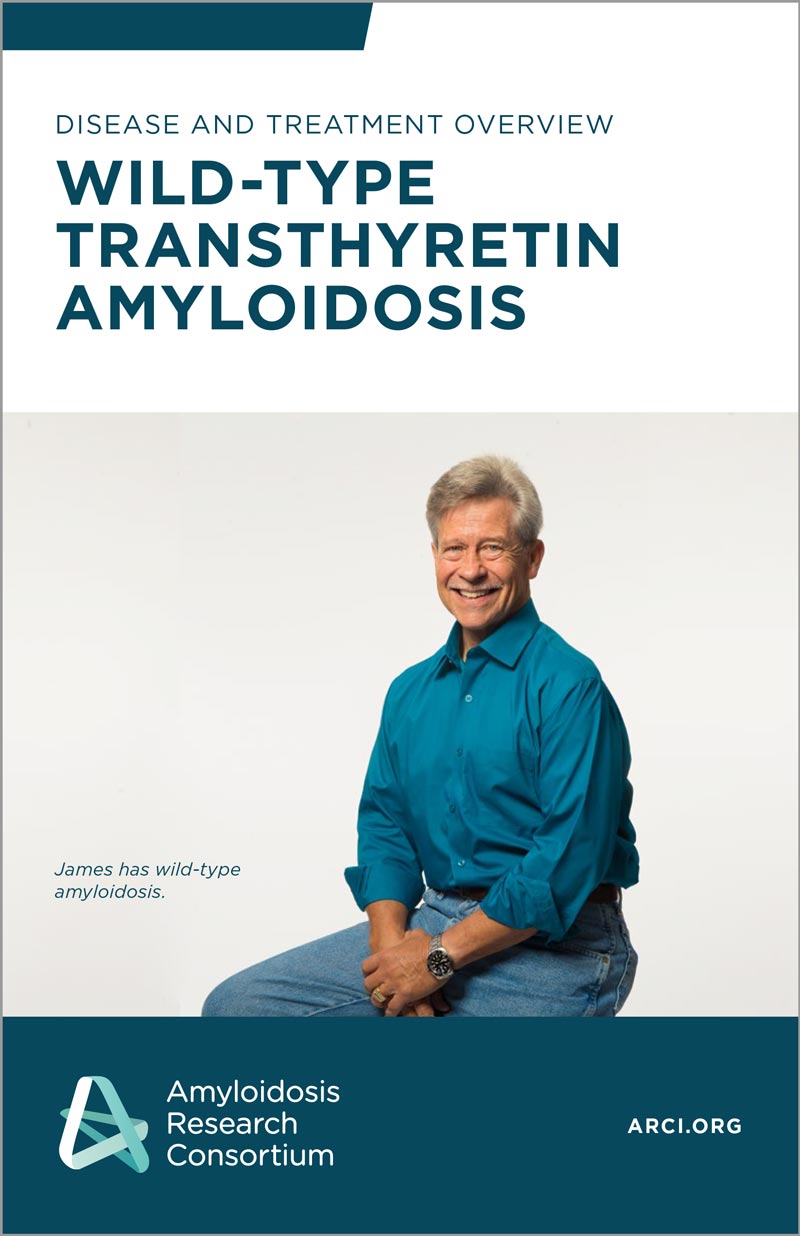
Disease and Treatment Overview: Wild-Type Transthyretin Amyloidosis
Wild-type transthyretin amyloidosis (ATTRwt) is an age-related disease caused by transthyretin (TTR) proteins that become unstable, misfold, and build up in organs, impairing their function. It is a slowly progressive condition that affects older people, most often Caucasian men over 65 years of age. Heart disease is the hallmark of ATTRwt, but it is commonly preceded by other conditions, such as carpal tunnel syndrome or spinal stenosis.
Read More
Library
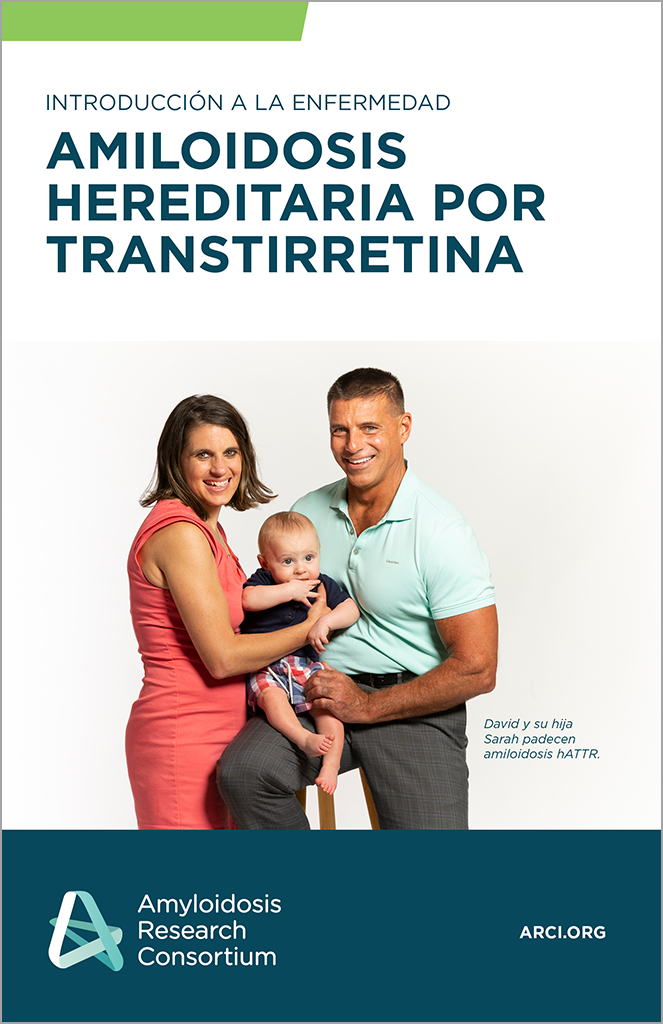
Introducción a la Enfermedad: Amiloidosis Hereditaria Por Transtierrentia
La amiloidosis hereditaria por transtiretina (hATTR) es una enfermedad sistémica poco común que se transmite de padres a hijos. Causada por mutaciones genéticas en el gen de la transtiretina (TTR), provoca una acumulación de proteínas anormales llamadas amiloide en uno o más órganos y tejidos, lo que altera su función. Si no se trata, hATTR puede causar complicaciones potencialmente mortales. El diagnóstico y el tratamiento tempranos son fundamentales para prevenir o retrasar la progresión de hATTR.
Read More
Library
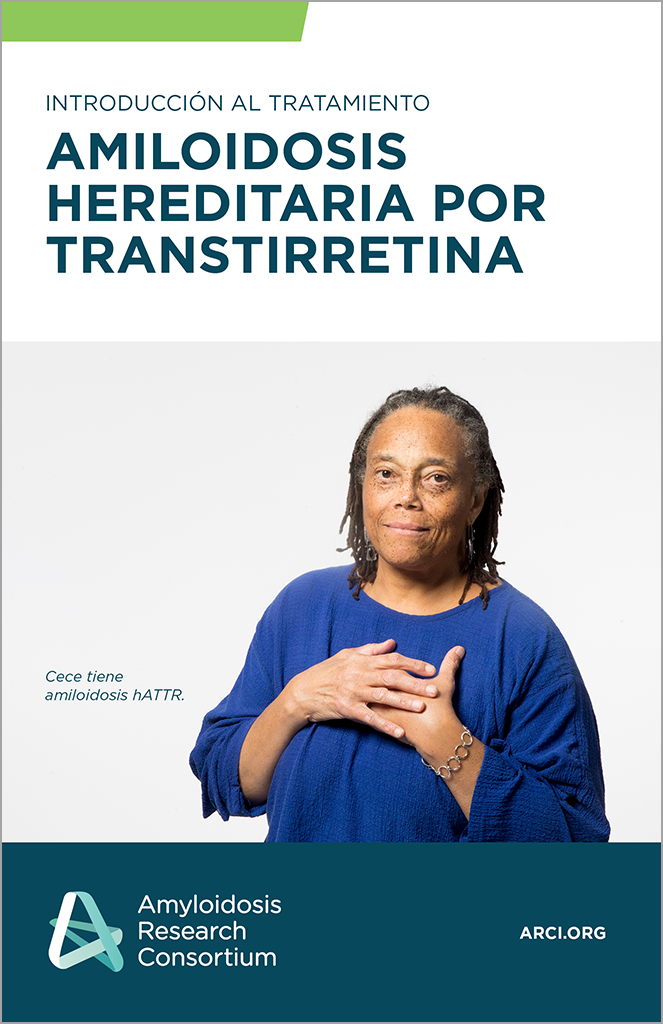
Introducción al Tratamiento: Amiloidosis Hereditaria Por Transtierrentia
Vivimos en una época de rápidos avances en los conocimientos genéticos y las tecnologías farmacológicas. El ritmo de los descubrimientos se está acelerando, impulsando el desarrollo de nuevas terapias. El curso exacto de hATTR varía según cada paciente, pero el pronóstico es prometedor para todos. Este folleto está diseñado como una guía integral para ayudarlo a usted y a su familia a navegar por los recursos y opciones de tratamiento que serían más efectivos para usted.
Read More
Library
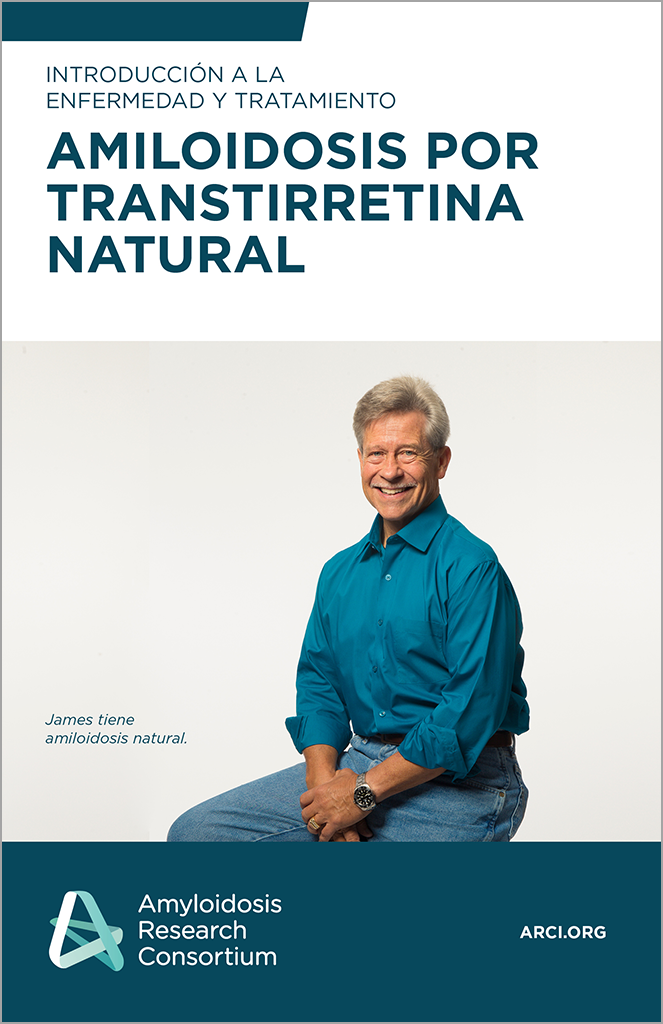
Introducción a la Enfermedad y Tratamiento: Amiloidosis Por Transtirrentia Natural
La amiloidosis por transtiretina de tipo salvaje (ATTRwt) es una enfermedad relacionada con la edad causada por proteínas transtiretina (TTR) que se vuelven inestables, se pliegan mal y se acumulan en los órganos, lo que altera su función. Es una afección de progresión lenta que afecta a personas mayores, con mayor frecuencia a hombres caucásicos mayores de 65 años. La enfermedad cardíaca es el sello distintivo de ATTRwt, pero comúnmente va precedida por otras afecciones, como el síndrome del túnel carpiano o la estenosis espinal.
Read More
Library
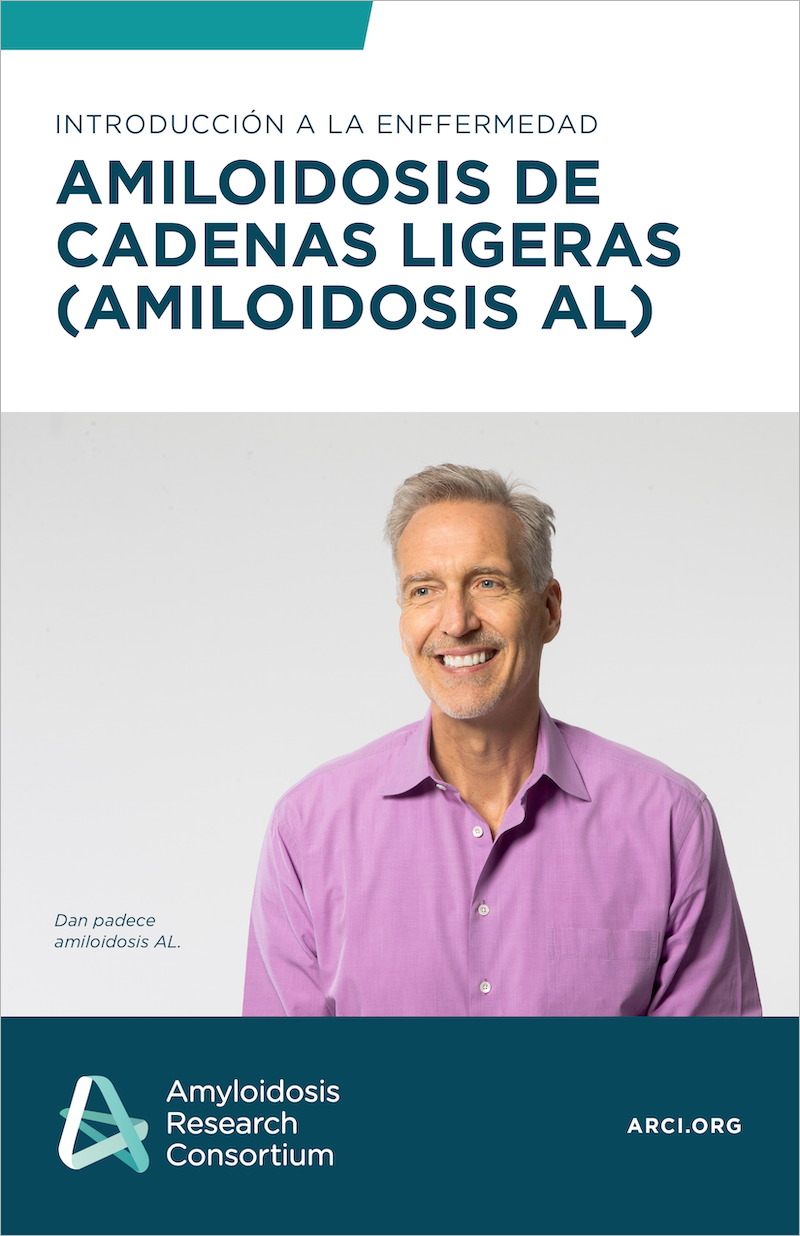
Introducción a la Enfermedad: Amiloidosis de Cadenas Ligeras (Amiloidosis AL)
Un diagnóstico de amiloidosis de cadenas ligeras (amiloidosis AL) puede ser confuso y estresante, lo que da lugar a muchas preguntas y sentimientos. Es fundamental que aprenda todo lo que pueda sobre la enfermedad, su tratamiento y cómo le podría afectar.
Read More
AL Amyloidosis
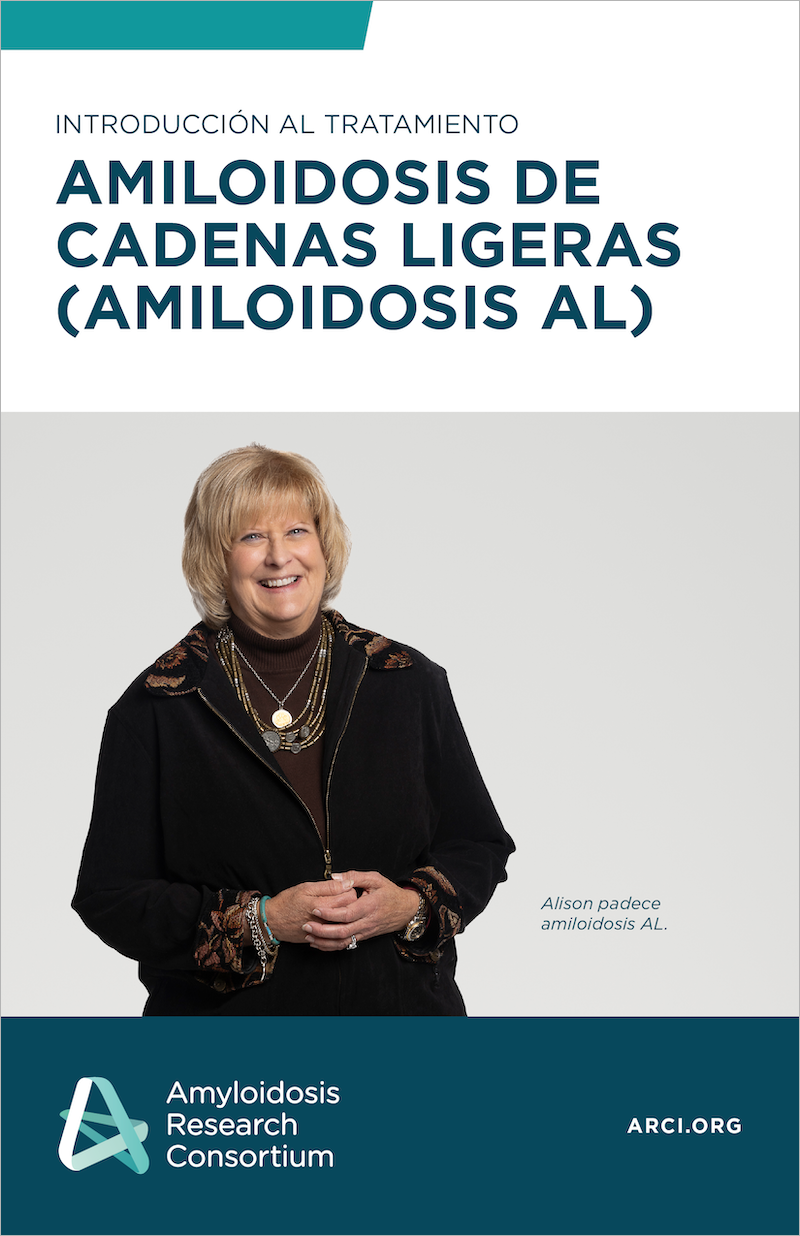
Introducción al Tratamiento: Amiloidosis de Cadenas Ligeras (Amiloidosis AL)
La amiloidosis AL es una enfermedad grave que puede ser progresiva y mortal si no se trata. Sin embargo, muchos pacientes se benefician de los tratamientos actuales, lo que mejora y prolonga su vida, a menudo durante varios años.
Read More
AL Amyloidosis
Amyloid Neuropathy Burden and Mangement
In this ARC Talks webinar, Dr. Kelsey Barrell from the University of Utah explains what causes neuropathy and other neurological symptoms in amyloidosis patients and offers suggestions to help manage these symptoms.
Read More
AL Amyloidosis
GI Disturbances and Symptom Relief for Amyloidosis
Dr. John Clarke, a gastroenterologist and motility specialist with Stanford Medicine, covers everything that patients need to know about GI involvement and symptom management in amyloidosis, followed by a Q&A session.
Read More
Webinars
Caregivers: A Guide to Self-Care
Nancy Verel, a nurse at the Cleveland Clinic, shares her story about her family's journey through her husband's AL amyloidosis diagnosis and treatment. Robert David from BMC Cancer Support Programs provides coping and support strategies for caregivers.
Read More
AL Amyloidosis
Physical and Occupational Therapy – Managing Your Amyloidosis
In this patient webinar, Mayo Clinic's occupational therapist Sarah Dahlhauser, OTD, OTR/L, and physical therapist Sarah Boyd, PT, DPT, discuss exercise principles for maintaining mobility and function, and home modifications for improved safety for amyloidosis patients.
Read More
AL Amyloidosis
Genetic Testing for Hereditary TTR Amyloidosis
Genetic counselors Emily Brown and Katelyn Swade provide an overview of the science of genetic testing. They also discuss importance of genetic counseling for hereditary ATTR patients and their families.
Read More
Webinars
Webinar: What is Expanded Access?
This webinar covers access to innovative new therapies through expanded access programs with guest speakers Jennifer Miller, PhD, Assistant Professor at Yale University School of Medicine and Alison Bateman-House, PhD, MPH, Assistant Professor at NYU School of Medicine.
Visit Website
AL Amyloidosis
No Resources found for the chosen category



